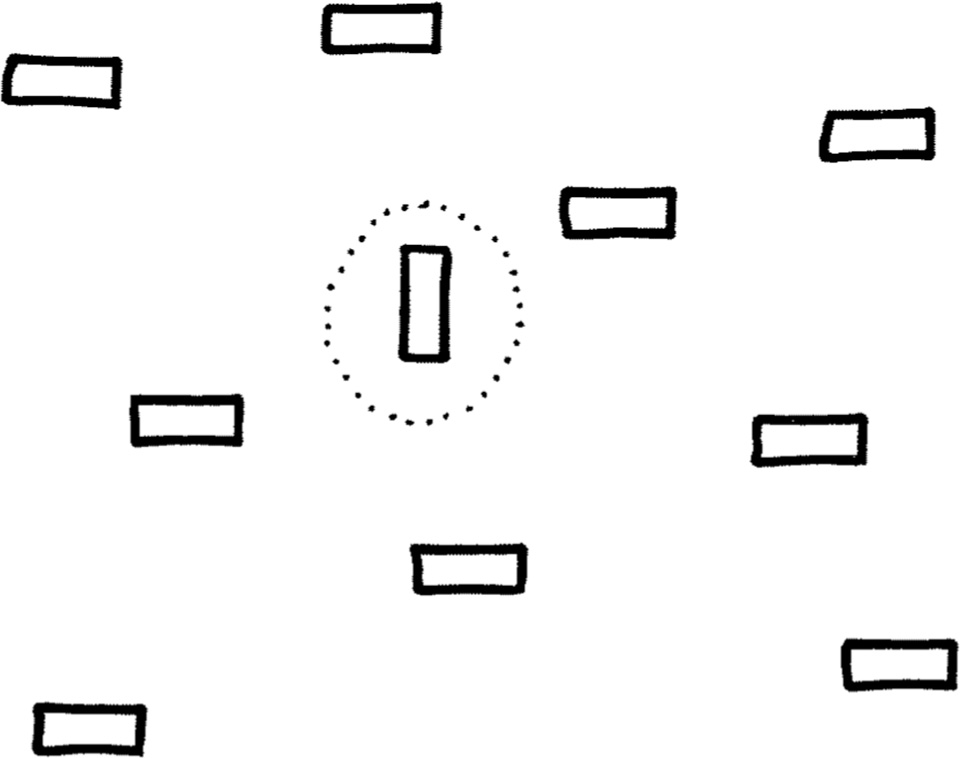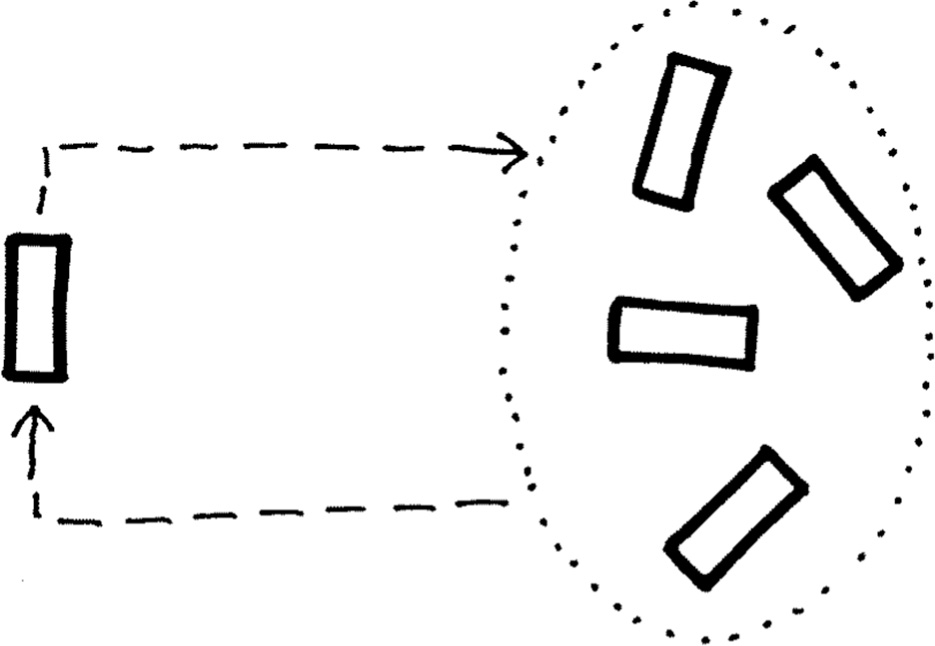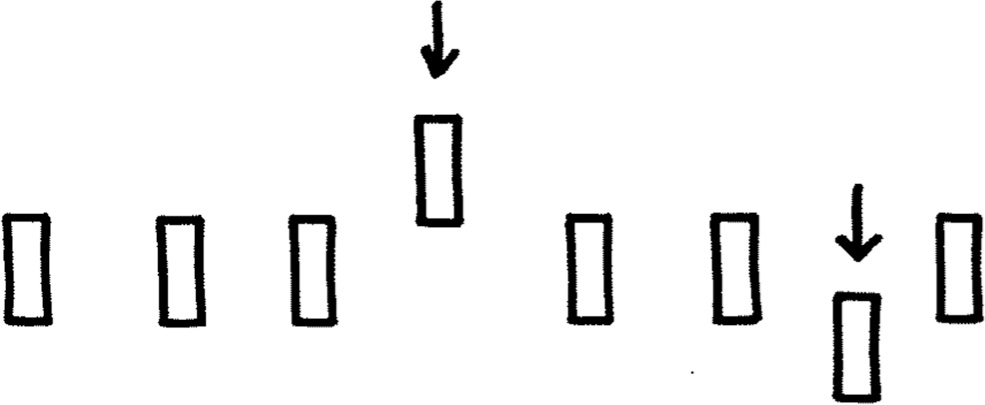I, WE AND IDENTITY
# 120
What sign of the zodiac are you? What is your Chinese astrological sign? If a Chinese girl has the combined signs of ‘tiger’ and ‘fire’ her birthday is kept secret, for otherwise no one would marry her. It is said that the birth rates in Chinese communities vary considerably according to whether it is a good or bad sign to be born under.
Some people look ‘under their stars’ for fun. Others take it quite seriously.
How do we know who we are? The zodiac signs provide neat little boxes. We are placed in a box according to our birth date. There is no subjective judgement about it. Then we read out from that box who we are.
How else can we tell who we are? We suspect that our own assessment will be biased and incomplete. We suspect that our friends will not tell us the truth. We may prefer to pay an expensive psychiatrist to tell us.
# 121
In the days of the Cold War there were major spy scandals from time to time. I was always amazed at how little money spies were paid for very dangerous assignments that could cost them their careers and even their lives (as with the Rosenbergs). Why would anyone want to take such risks?

There can be the ideological drive. There can be entrapment, where one small step leads to another and through blackmail someone becomes a reluctant spy.
In some cases I believe the driving force is the feeling of ‘being special’. You are sitting in a restaurant with lots of people around you. Not one of them knows that you are a spy. You feel very special and different from everyone else in that restaurant. Your friends think they know you. But you are more special than they think.
So being a spy is a powerful definition of your identity.
# 122
In a way, all ‘missions’ give a sense of identity. With terrorist groups there is both the sense of ‘mission’ and also the sense of identity derived from the group identity.
In the old days IBM had such a very strong corporate culture that people who worked for IBM felt themselves to be IBM-ers. They were proud to belong to that group. When IBM workers were asked if they would like to join unions they usually declined. Who needed to belong to a union if you already belonged to IBM?
Motor cycle gangs have a notorious sense of identity and pitched battles between rival gangs have left people dead.
Street gangs have their own sense of identity and drive-by shootings are an unpleasant expression of that identity.
Gangs give people a sense of identity through belonging. They not only have their own puny identities but there is now the larger, more powerful identity of the gang.


It is interesting that in some countries, like Latin America and China, the family is itself a ‘gang’ with a strong sense of identity. In other countries families are regarded as no more than a necessary part of growing up. Family members might always be ready to help another family member who was in trouble, but otherwise they would rather be further apart than closer together.
I knew one family in the USA who spent $900,000 a year suing each other. That is one form of relationship.
# 123
Families and gangs provide identity, purpose and a base. There is always some place where you are accepted. There are always some people who might be expected to help you.
In the outer world people will only help you out of compassion, because they like you or because they need something from you. With the gang and the family you get help automatically without having to be liked too much. It is a mutual insurance scheme like any other mutual insurance scheme. You all agree to help each other. Help is no longer based on individual assessment at any one moment.
The ‘values’ involved in belonging have already been considered in a previous chapter. Here we are concerned with the sense of ‘identity’.
# 124
Imagine yourself at a football match where your favourite team is playing. Would you ever consider shouting support for the other team? It would be unthinkable. You would be tearing your own identity apart.
We define our group identity as much by what we dislike as by what we like. You feel obliged to dislike the other group in order to reaffirm the boundaries of your own group. You seek to show your fervent support by insulting and even attacking the supporters of the other football team.
Ethnic hatred of another group is what defines the specialness and superiority of your own group. Hate gives a permanent mission.
The group that is the subject of the hatred gets an even stronger sense of identity. The very strong sense of identity of the Jewish community comes from centuries of persecution. The early Christian communities were also advantaged by being persecuted from time to time.
# 125
People seek to be acceptable in clubs and groups. The expression ‘he is one of us’ occurs in several languages and means acceptance in the group.
In Japan people whose ancestors were tanners several centuries ago are still defined by that grouping. Tanners lived together in villages rendered smelly by their work. So no one wanted to marry a tanner. Foreigners in Japan are still regarded as foreigners even if they have lived there for several generations (as some Koreans have).

# 126
The Japanese seem to have a different concept of identity from the Western one. In the West there is a single ego which integrates the person throughout the day. At the office, at home and at a reception.
In Japan, the group culture is so much stronger than the ego culture that there sometimes seems to be a totally different person on different occasions. During the day there is the ‘business’ man. In the evening there is the Japanese ‘businessman’, who goes to his girlie clubs and drinks far too much. In the later evening there is the ‘family’ man, who goes home and is a dutiful husband.
There is more sense of fitting and integrating into the group rather than expressing an individual ego all the time. Egos are regarded as rather crude and pushy. Having a strong ego is not unlike having bad breath. No one wants to get too close to you.
# 127
Philosophy has always had a big problem with consciousness. We can see a machine working but we know that the machine does not have a consciousness of its own working. ‘Consciousness’ is the typical sort of philosophical non-problem, like the apparent argument between free will and determinism. We set things up in such a way that we cannot be satisfied by any answer.
Imagine there is a bright light behind you at all times. Your shadow is continually thrown on the white wall in front of you. You become aware of your shape and your movements. Through this external shadow device you develop a ‘consciousness’ of yourself.

If we put a bright light behind the machine and gave it some way of observing its shadow, would that machine be conscious?
We are conscious of where our limbs are because there are sensors in the muscle which tell us which muscles are being used. In a large brewery I once visited in Malta, a highly automated system showed on a central computer screen the state of every fluid valve in the system. That computer screen was the ‘consciousness’ of the system.
As an organizing boundary for our consciousness of ‘self’ we find it convenient to choose the limits of our own skin. When we derive our sense of identity from the group, that ‘skin’ is enlarged to include the group as well.
# 128
There may be a dependence on a group for identity or there may be a dependence on one other person. That other person provides the evaluation of behaviour. You seek that other person’s approval. That other person provides direction and action choices. That other person sets the values and perceptions. You cannot make your own mistakes. Uncertainties and confusions are lessened. You just want to follow or to ‘flow’ with the action.
With a group, not only do you depend on the whole group for identity but your personal identity also depends on your accepted position in the group. The way the other members of the group treat you defines your personal identity. Italian groups are excellent at assigning different roles and positions to all group members.
# 129
In one of its aspects love is a form of dependence. We want ‘attention’ and ‘approval’ from that other person. If it is not forthcoming or is cut off we feel worthless enough to commit suicide.
We rarely have the sense of perspective to treat love as we might treat a bout of influenza – something that comes and goes. It is not a matter of our ‘ego’ being involved with another ‘ego’. Instead, our ego exists through its dependence on another ego. It is sometimes said that you have to be slightly neurotic to be truly in love.
Is love selfish because it demands and expects? Is love selfless because it wants to give? But is that giving no more than an investment in getting?
# 130
It could be argued that all our actions are ‘selfish’. Even the most selfless behaviour of a saint could be seen to be selfish for a number of reasons:
- 1. It makes that person ‘feel good’ to be selfless and to help others. There is a sense of mission, fulfilment, accomplishment and virtue.
- 2. It makes that person feel good to know that he or she is pleasing God and following God’s will.
- 3. It makes that person feel good to know that a good example has been given to others who might also set about helping the less fortunate.
So we have the conundrum: is it selfish to be selfless when being selfless is what you want to do most of all?

# 131
Our identity can be defined to ourselves by our actions and choices as much as by group labels or personal introspection.
Actions express values, personality and capability. Actions can give that success which also identifies us.
There are also times when action can be a way of escaping from having to think about oneself. Instead of reflection and introspection you busy yourself with endless action. Distraction is like a train that is always moving and never has to get anywhere.
# 132
Since Freud there has been a well-established notion that feelings should be expressed. If they are repressed this is supposed to lead to stomach ulcers and neurosis and lots of other bad things.
The expression of feelings is obviously beneficial because otherwise how are other people going to know what you feel? Also, if you express your feelings all the time, then no one takes them very seriously on any one occasion. Because Mediterranean people are always expressing their feelings, an apparently violent argument means far less than it would in England. People who seem the most violent of enemies are seen drinking together as friends two hours later. The theatre of emotions is seen as such.
‘I love you forever or until next Monday’ is both sincere and practical.
There does come a point, however, where self-expression becomes very selfish indeed. You need to express yourself, so you ‘dump’ on anyone around. You need to be ‘assertive’, so other people’s sensitivities are unimportant.
Freud started the movement that declared that inhibitions were ‘bad’. Does this imply that lack of inhibitions is good?
Inhibitions are the lubrication of civilization. Without inhibitions you do not care what you do. You do not care if you upset someone. You do not care if you shirk your responsibilities. You do not care if you let people down.


Wisdom suggests that in the matter of ‘inhibitions’ we have a classic ‘salt curve’ or ‘Laffer curve’.
- no inhibitions is bad
- some inhibitions is good
- too much inhibitions is bad.
The ‘me’ cult of self-expression only works if the bulk of what is expressed is constructive.
# 133
Identity can be established through self-conscious style. The one thing Oscar Wilde was producing throughout his life was ‘himself’.
The traditional post-Freudian approach has been to dig ever deeper in an attempt to discover the ‘true self’.
But maybe when you dig deeper you discover more and more garbage. This ‘digging’ for the truth is an arbitrary model derived from the Gang of Three.
Maybe we should be in the ‘design’ business rather than the ‘excavation’ business. Maybe we should be designing our own style or the ‘mask’ behind which we want to face the world.
Maybe the ego and identity are to be designed and constructed through continued effort. They are not there to begin with, they need not be borrowed and they are not going to be discovered.
It is part of wisdom to realize this possibility.
How do you want to be? Design it and do it.

# 134
There are times when we seek to establish our identity with titles, status and power.
These are devices that ensure that people give us respect. In New York I have sometimes been surprised to find myself having lunch with someone who has assumed a title in order to get a better table reservation.
Sometimes these external definitions of identity give a person enough confidence to develop a true identity. Sometimes they have exactly the opposite effect and these artificial props prevent the development of any other identity. Both are possible.
Boys who go to Eton (a leading school in England) acquire a special sort of confidence that they are an elite. That confidence is valuable if it becomes the base for developing skills and useful qualities. It is dangerous and inhibiting if it is seen as a sufficient qualification in itself.
# 135
The world may not be as full of ‘heroes’ as it once seemed to be. Today’s heroes are stars from the world of entertainment and sport. As role models they may have little to offer because skill in a particular field is not translatable into general lifestyle. In many cases the lifestyle itself is not specially heroic.
So ‘comparison identity’ is difficult. It can still be directed at parent figures, brothers or sisters. Why can’t I be like that?
The setting of expectations and ambitions for oneself becomes a form of comparison identity. You then compare yourself with that image or ideal. This image can lead you forward. It can also create doubts. At times it can generate despair. How can I ever be like that?

# 136
In a book (Tactics, HarperCollins 1995) that was based on interviews with successful people, there was one thing that stood out. Almost all the successful people had had a strong sense of ‘the expectation of success’. When things were bad and there was a downturn of fortune they did not despair. They regarded every downturn as merely another step towards the goal.
This strong sense of perspective is a key factor in wisdom.
When you are depressed you believe that you are now being realistic and that the dreams you had at other times are no more than dreams. You are ready to give up. The depressed state of mind is seen as the ‘realistic’ state of mind. The depressed state of mind is the truly abnormal state of mind. Your dreams are still as valid as they were before. Depression is like feeling seasick. Even the thought of food nauseates you. The seasickness passes and food tastes great again.
How do you know if your dreams are realistic? How do you know if you are ever going to attain them? Can every politician become prime minister?
A scientist holds a hypothesis and works with it. There is no guarantee that this hypothesis is going to work out. It is something to be going forward with. When accumulating evidence suggests that the hypothesis is not going to work the scientist sets about designing a new hypothesis.
It is the same with dreams. Stay with them until accumulating evidence suggests they are not going to work. Then change them – or stay with them if they still keep you happy. That is wisdom. Being realistic is often part of wisdom but not always.
# 137
A plant is not fully grown until it is fully grown. Imagine a plant that went on growing and developing until it died. An identity is not a roll of film that you take to be developed. The developed film then reveals ‘what is’ and what will be forever. An identity is like the ever-growing plant. The potential is there and the general form is there. The leaves and the branches make up the plant even as habits, dreams, talents and achievements make up identity.